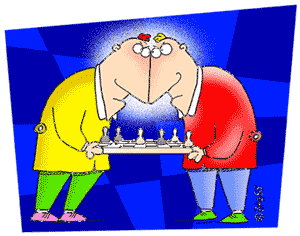This article is aimed at people who are just starting out in chess and want to know what it takes to play solid chess games. The fundamentals of chess are very important. Before you can get into chess openings or advanced chess strategies and tactics, you will need to learn the foundations of solid chess play, which is what this article is aimed at. I have listed 5 of the basic fundamentals of chess that I feel are an absolute necessity for any chess player, especially beginners, if they are to play winning chess.
1. Develop your pieces
You cannot drive a car if you don’t get in the car first (unless it is a remote-controlled toy car). In chess, you have to develop your pieces. Often, it is tempting for beginners to want to carry out an attack with only a couple pieces. This is not winning chess. As a rule of thumb, you need to develop all of your minor pieces (knights, bishops) in the opening, before launching or planning an attack. Castling your king to safety is part of the development, try to always castle. There are exceptions to this rule, but normally it is a good guideline to follow to play winning chess.
2. Try to look 2-3 moves deep
Once you think you have figured out what your next move is going to be, make sure it is not an obvious blunder. For example, make sure the chess piece you are going to move is not going to get captured without anything in exchange, or by moving the chess piece you haven’t created a weakness in your position (this is mostly for intermediate-advance play). The usual thought process should go at least 2-3 moves deep into the position. That just means you should look at the main replies to your move, and your main replies to those moves and check to make sure you won’t be making a blunder (mistake).
3. Look from your opponent’s view
When trying to figure out how your opponent will reply, look at the position from their point of view. What are they trying to plan? What are they threatening? Which of their pieces is being threatened? When it is your move, pretend you are the other side and that it is your move. If you find something advantageous for the other side, make sure to prepare for that by making the appropriate move on your side. If you can see what your opponent is trying to plan, it will help you make stronger defensive chess moves and have a good overall plan on the defense.
4. Control the center
This is very important. The center 4 squares of the board are usually the most active during the middlegame (after the pieces have been developed). If you can dominate and control these four squares with your pawns and minor pieces, you will be able to place your pieces on those squares and not have to worry about having them captured. Having pieces on these central squares can be advantageous because this maximizes the range of your piece as they have more squares to move to in the center than they do in a corner. Also, in the center, the pieces can easily move to one side of the board or the other, and all in one move!
5. Always have a plan
This cannot be stressed enough. Often beginners will make a move that does not really accomplish anything. In chess, always have a plan. The basic building blocks of any chess strategy or tactic is having a plan. It is up to you to determine what your plan is. It can be something like “get all my minor pieces developed” or “eventually get my knight to this square so that it can control that square” or “have the knight capture that piece so that when he captures back, I will be able to take his rook for free”. Often it is good to have “wishful thinking” and wish for a certain position that might be possible from the current position and see if you can make any kind of plan to reach a position similar to this wishful position.
There are many ways to improve in chess. You might want to research the internet. There are thousands of sites aimed solely at improving your chess games by learning the fundamentals. What I have listed here is what I consider to be the basic fundamentals of chess needed before you can try to use any kind of strategy or tactic in chess.
